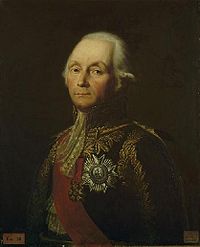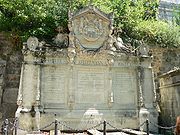- François Christophe de Kellermann
-
François Christophe de Kellermann 
François Christophe de KellermannBorn 28 May 1735
Strasbourg, FranceDied 23 September 1820 (aged 85)
Paris, FranceAllegiance  France
FranceRank Marshal of France François Christophe Kellermann or de Kellermann, 1st Duc de Valmy (28 May 1735 – 23 September 1820) was a French military commander, later the Général d'Armée, and a Marshal of France. Marshal Kellermann served in varying roles throughout the entirety of two epochal conflicts, the French Revolutionary Wars and the Napoleonic Wars.
Contents
Early life
He came from a Saxon family, which was long settled in Strasbourg and ennobled. He entered the French army as a volunteer, and served in the Seven Years' War and in Louis XV's Polish expedition of 1771, on returning from which he was made a lieutenant-colonel. He became brigadier in 1784, and in the following year marechal-de-camp.
François was the only son of two Germans living in the French department of Alsace. His father was François de Kellermann and his mother baroness Marie von Dyrr (Dyhrn).[1]
Revolutionary career
In 1789 Kellermann enthusiastically embraced the cause of the French Revolution, and in 1791 became general of the army in Alsace. In April 1792 he was made a lieutenant-general, and in August of the same year there came to him the opportunity of his lifetime. He rose to the occasion, and his victory over the Prussians at the Battle of Valmy, in Goethe's words, "opened a new era in the history of the world". Napoleon later commented that: "I think I'm the boldest general that ever lived, but I daren't take post on that ridge with windmill at Valmy (where Kellermann took position) in 1793."
Transferred to the army on the Moselle, Kellermann was accused by General Custine of neglecting to support his operations on the Rhine; but he was acquitted at the bar of the National Convention in Paris, and placed at the head of the army of the Alps and of Italy, in which position he showed himself a careful commander and excellent administrator.
Shortly afterwards he received instructions to reduce Lyon, then in revolt against the Convention, but shortly after the surrender he was imprisoned in Paris for thirteen months. Once more honourably acquitted, he was reinstated in his command, and did good service in maintaining the south-eastern border against the Austrians until his army was merged into that of General Bonaparte in Italy.
Imperial career
Kellermann was then sixty-two years of age, still physically equal to his work, but the young generals who had come to the front in the previous two years represented the new spirit and the new art of war, and Kellermann's active career came to an end. But the hero of Valmy was never forgotten. When Napoleon came to power Kellermann was named successively senator (1800), president of the Senate (1801), honorary Marshal of France (19 May 1804), and title of Duke of Valmy (1808).
In his service to the First French Empire, Kellermann was frequently employed in the administration and training of the army.[2] He also took control of the line of communications and the command of reserve troops, and his long and wide experience made him one of Napoleon's most valuable assistants.
In 1814 he voted for the deposition of the emperor and became a peer under the royal government of Louis XVIII. After the "Hundred Days" he sat in the Chamber of Peers and voted with the Liberals.
Marshal Kellermann died in Paris on 23 September 1820, and is buried in Père Lachaise cemetery.[3]
His son François Étienne de Kellermann, 2nd Duke of Valmy, also fought for Napoleon and was promoted to cavalry general after the Battle of Marengo.[2] Kellermann's grandson was the politician François Christophe Edmond de Kellermann.
References
- ^ Genealogy reference - parents of Marshal Kellermann
- ^ a b Kielland, Alexander Lange (1908). Napoleon's men and methods. New York: Brentano's. p. 45. OCLC 3636503. http://books.google.com/books?id=ioUfAAAAYAAJ&dq=Battle%20of%20Valmy%20%2BNapoleon%20-wikipedia&pg=PA45#v=onepage&q=Battle%20of%20Valmy%20+Napoleon%20-wikipedia&f=false.
- ^ Brown, Frederick (1973). Père Lachaise: elysium as real estate. New York: Viking Press. p. 61. ISBN 0670548049. OCLC 698450.
Further reading
- J. G. P. de Salve, Fragments historiques sur M. le marechal de Kellermann (Paris, 1807), and De Botidoux, Esquisse de la carrière militaire de F. C. Kellermann, duc de Valmy (Paris, 1817).
References
- ^ Genealogy reference - parents of Marshal Kellermann
- ^ a b Kielland, Alexander Lange (1908). Napoleon's men and methods. New York: Brentano's. p. 45. OCLC 3636503. http://books.google.com/books?id=ioUfAAAAYAAJ&dq=Battle%20of%20Valmy%20%2BNapoleon%20-wikipedia&pg=PA45#v=onepage&q=Battle%20of%20Valmy%20+Napoleon%20-wikipedia&f=false.
- ^ Brown, Frederick (1973). Père Lachaise: elysium as real estate. New York: Viking Press. p. 61. ISBN 0670548049. OCLC 698450.
 This article incorporates text from a publication now in the public domain: Chisholm, Hugh, ed (1911). Encyclopædia Britannica (11th ed.). Cambridge University Press.
This article incorporates text from a publication now in the public domain: Chisholm, Hugh, ed (1911). Encyclopædia Britannica (11th ed.). Cambridge University Press.
External links
Marshals of the First French Empire  Categories:
Categories:- 1735 births
- 1820 deaths
- People from Strasbourg
- Military leaders of the French Revolutionary Wars
- Dukes of Valmy
- Marshals of France
- French military personnel of the Seven Years' War
- French military personnel of the French Revolutionary Wars
- French commanders of the Napoleonic Wars
- Burials at Père Lachaise Cemetery
Wikimedia Foundation. 2010.


